Relokatsiya in Luxoft: how is life left
We asked three of our employees to share their impressions of the move. Three people - three countries: India, Malaysia, Poland. Each has its own perspective, its own reasons for moving, its own personal circumstances, its own career path.
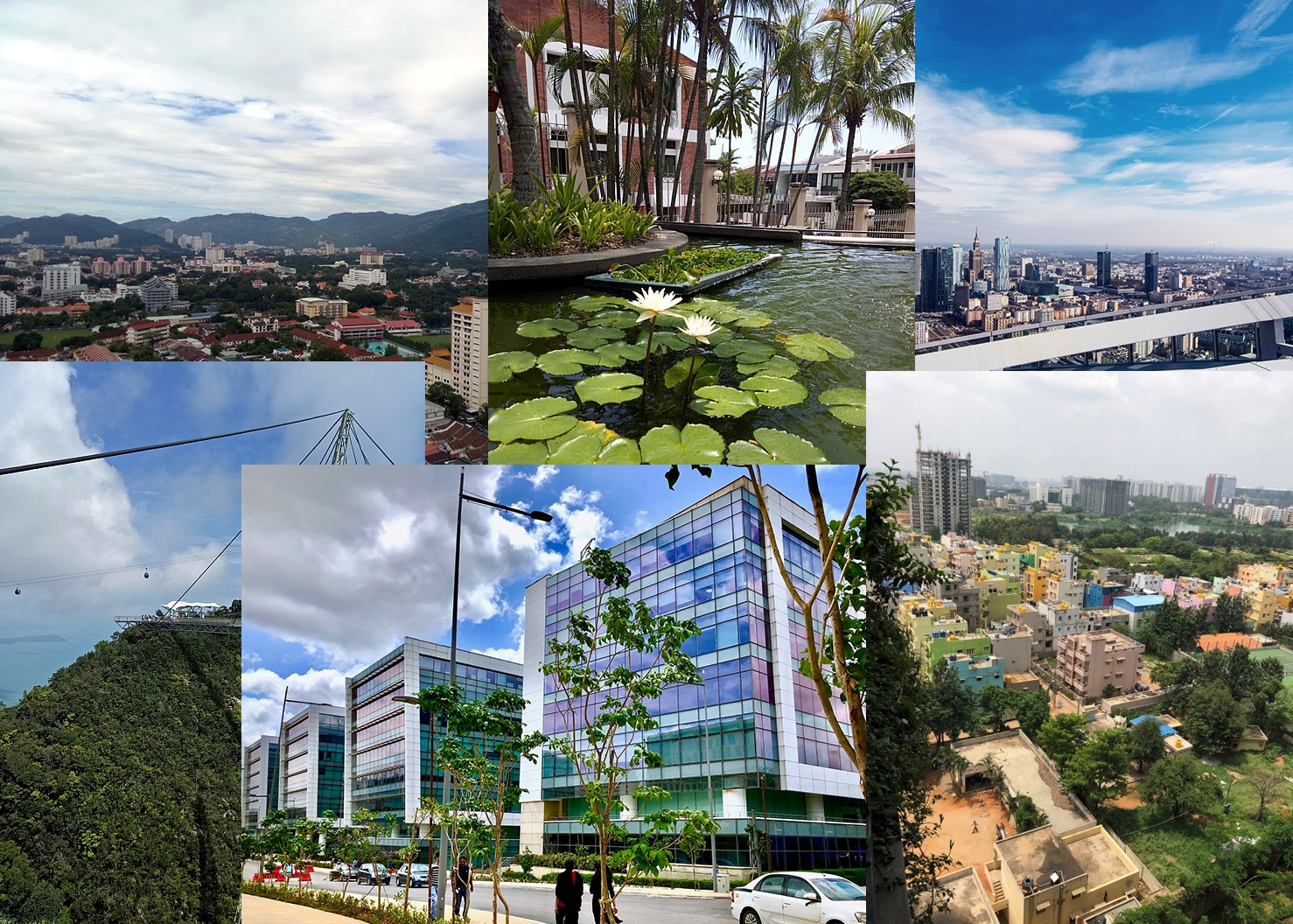
Life, people, food, office - all under the cut.
Like other system processes, the relocation in the company is on a firm footing. Many of our employees have been moving to Luxoft offices in Europe, the USA and Asia for years. We have long wanted to ask them how they are there, and we think that many will be interested too.
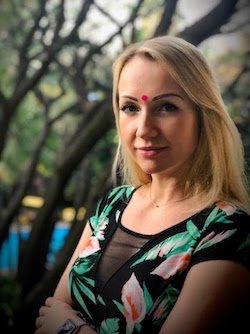 At Luxoft, I have been living and working in Bangalore, southern India for almost two years and for the fifth month. I am doing almost the same thing as at home - I lead a part of the team that serves a large client with long-term projects.
At Luxoft, I have been living and working in Bangalore, southern India for almost two years and for the fifth month. I am doing almost the same thing as at home - I lead a part of the team that serves a large client with long-term projects.
I moved with my husband. He is also an employee of Luxoft. True, in Ukraine we didn’t overlap in our work. In India, he had great opportunities for professional and career growth. By luck, a suitable role was found in the local office and for me.
In March, two months before relocation, we were given a study tour. We visited Luxoft's office, met our local colleagues, and started looking for a place to live.
Of course, we hesitated. The country is exotic. To ask for advice was really no one at Luxoft, we were the first to be offered to move to India. But we have long been going to live abroad, and the market has attracted us, and the projects that we had to lead. So they decided to become pioneers.
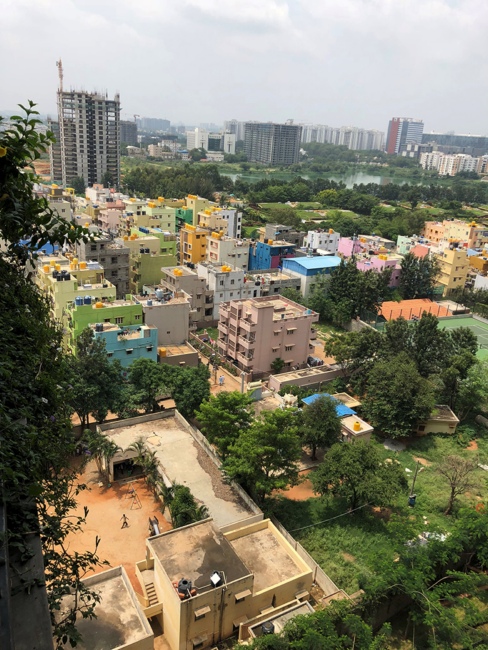
The company helped us to settle all kinds of formalities. Tourist visa is electronic, no problems arose with it. Then it was necessary to apply for a work visa and pass an interview with the consul, and we managed to turn this procedure in a matter of days. So then the red tape began with the documents. The papers required a whole bale, including proof of the grounds for obtaining the work. For example, it was only recently that they gave me a bank card, and we got used to the fact that it was issued in two or three days. In general, drank bureaucracy.
Bangalore is called the "Indian Silicon Valley". From the point of view of perspective, the comparison is suitable, but otherwise, everything else is different - both in the important and in the small things.
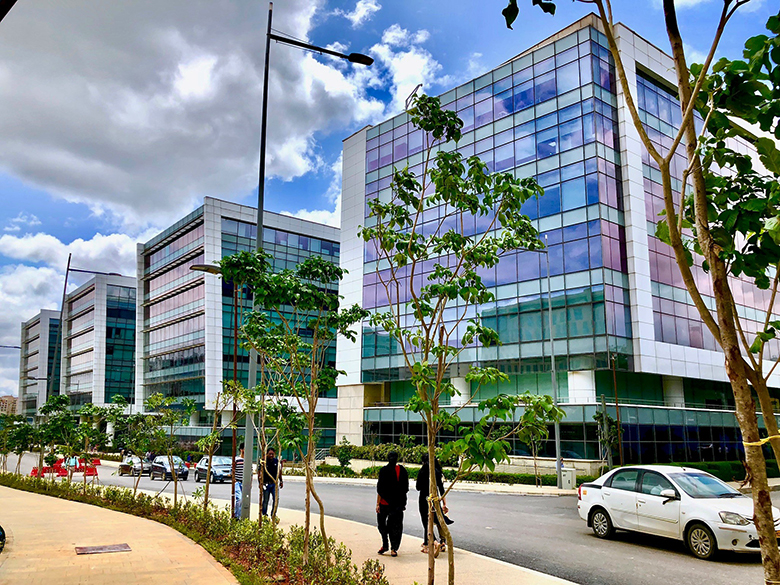
Get at least the situation on the roads - the first thing we encountered on arrival. It's all mixed up: cars, motorcycles, tuk-tuki. And the left-hand movement. Traffic regulations "as it is," but no one observes them. Noise, din, chaos. In some places, cars are moving at a speed of 5 km / h. Major accidents are few, probably precisely because everyone is driving so slowly. In addition, in Bangalore, not the first year they have built a ground metro, which is why half the city is paralyzed.
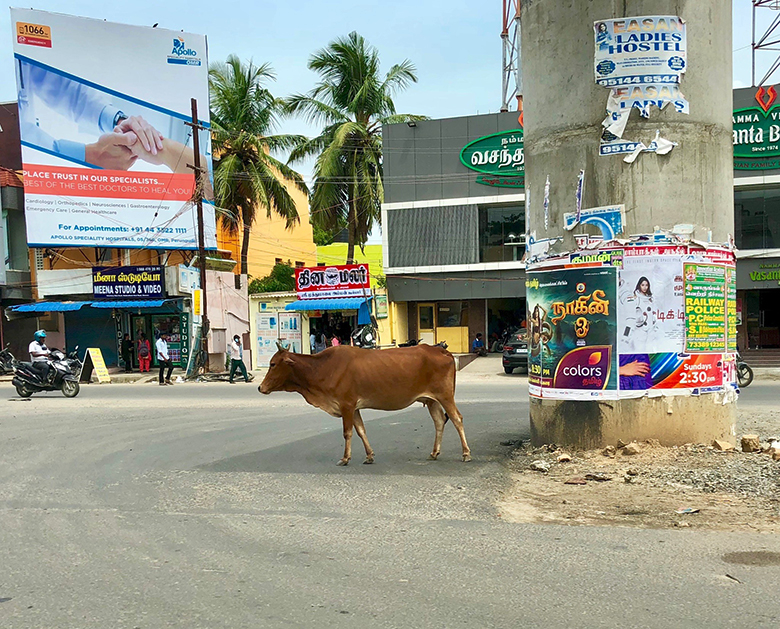
Something in which reality has significantly diverged from our expectations.
It was possible to save money, but with other things being equal, we tried to find housing even closer to work: here distances are measured not in kilometers, but in the hours that you spend on the road. I left in the morning not at 08:00, but at 09:00 - add the extra half hour to shaking in traffic jams.
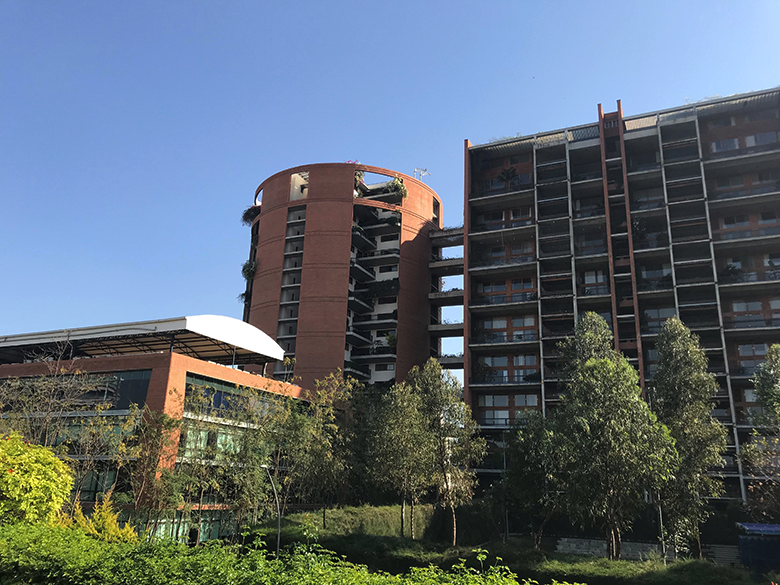
There is almost no middle class in the country. Contrasts are evident - either glaring poverty, or screaming luxury. You go to work and see the ruins on both sides of the street. But the five-star hotels always have a closed territory, at the entrance and at the entrance there is a full search, something like control at the airport. The same procedures in closed business complexes.
I do not want it to seem as if dark colors prevail in my impressions. Much pleasantly surprised me, including the Indians themselves. They are very friendly, open, funny. Not a bit too tight, not afraid to come into contact with you. Anyone, from a top manager to an intern, can come up and start asking you out with sincere participation.
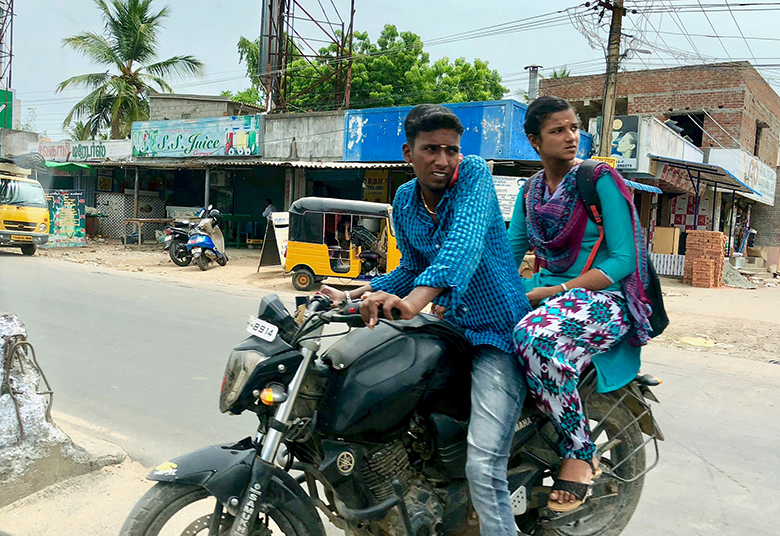
It would be a mistake to row all Indians with the same brush and consider them to be inactive. But what is needed is to be able to direct their good intentions in the right direction - to “push” colleagues. Often they violate agreements not out of malice: they simply find themselves unable to respond to a request with a refusal. They will say “yes”, but in order for this “yes” to end with the action you need, you have to keep the process under control.
But the workflows are familiar, since we have an IT company. Although it is necessary to keep in mind some nuances of legislation. For example, in India, before leaving for a new place, a specialist is obliged to work out three months on the old one. If you want to change the company earlier - pay a fine, or let the one who shatan you, is calculated for you, provided that the current employer does not mind.
Now it is warm, but during the day it is almost always cloudy and windy. Humidity - an average of 80%. It rains often, but not heavy, unlike Mumbai.
During these months we didn’t manage to travel around the country seriously, but we flew to Goa and Chennai to the western and eastern coast, respectively: what’s up there, about an hour by plane. We are here recently, so we continue to learn, and everything is ahead!
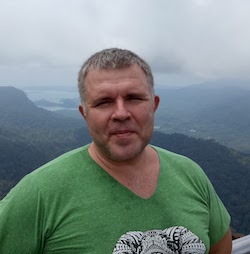 I was invited to Luxoft just under relocation to Malaysia. I have been with the company since November 2016, and in Malaysia since mid-January 2017. Upon arrival, I joined the newly assembled multimedia system project team for a number of Asian automakers.
I was invited to Luxoft just under relocation to Malaysia. I have been with the company since November 2016, and in Malaysia since mid-January 2017. Upon arrival, I joined the newly assembled multimedia system project team for a number of Asian automakers.
I did not have long torments of choice: an unfamiliar country with a mild climate, new opportunities for development, side by side with strong experts in the field of automotive. Arguments "for" outweighed.
Preparations for the move and the move itself passed without surprises. It was clear that the process in Luxoft is debugged. The relocation manager led me through all the necessary procedures. All I had to do was collect the documents: a diploma, a marriage certificate, birth certificates of children, and so on. The company itself was engaged in the design and legalization of documents, the airline tickets and the hotel of my choice were also booked.
The first priority was to find housing. There were no difficulties with it. Employees of the Malaysian office and colleagues who came earlier advised me to verified realtors. As far as I know, everyone who moved to us from other Luxoft offices found accommodation in two weeks, during which the company pays for hotel accommodation.
The paperwork and the opening of the account were also not too tricky: the relocation manager in the local office took over all the interaction with the official bodies. It only took me to come to the bank, where in half an hour all the formalities were settled.
In the morning of the first working day, the team leader took me from the hotel to the office, helped with all the technical issues, and introduced me to colleagues. I solved household issues already in a quiet mode.
Before arrival, I tried not to speculate either about the island of Penang, where I was to work, nor about Malaysia as a whole. To be honest, both Malaysia and the whole of Southeast Asia seemed to me a mix of fairy tales "Thousand and One Nights", advertising for the Bounty with snow-white beaches and stories about cannibal tribes robbing caravans of merchant ships.
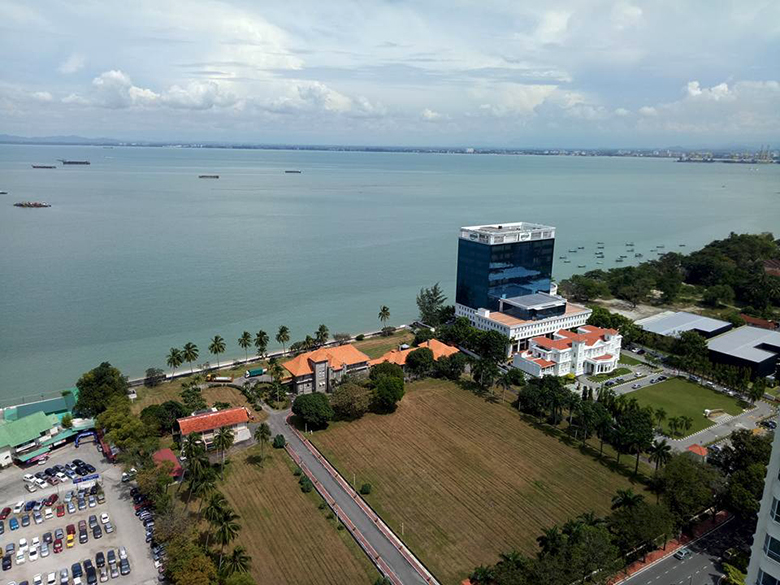
It was unexpected to discover how many different cultures coexist on the island, without interfering with each other. In Penang, and indeed in Malaysia, along with the indigenous population, Malays, live large communities of Chinese, a lot of Indians and representatives of other peoples. And they all get along peacefully, each preserving their traditions and culture. There were some concerns about Sharia law. But he calmed down when he saw Arab women wearing hijabs and chador, Indian women in bright sarees, Chinese girls in short shorts and light T-shirts walking the same streets and shopping centers.
What did not like: there are too few sidewalks in the city. There are areas where there are practically none. In general, the infrastructure for pedestrians is poorly developed. Every now and then you risk to fall under the wheels in a chaotic stream of cars and motorcycles. Moreover, most drivers respect each other.
The culture of the country is far from Central European. A lot of little things that you can only accept. For example, many locals love durian - a fruit with a very specific smell. It is forbidden to carry in hotels and public places. But sometimes love for him takes over. In the harvest season, a small car loaded with durian for all comers regularly arrives at one of our working locations.
For some time, it took me to get used to the Malaysian way of eating without appliances, with my hands: this is how it is accepted. Later, I just stopped noticing it.
Penang prices are deceptive. In the early days on the island, due to the difference in the course — the dollar is about the same as four local ringgits — they seemed ridiculously low to me. Lunch costs from 5 to 20 ringgits, depending on how hungry you are and what level the institution has chosen. In restaurants with European cuisine is more expensive.
My smoking colleagues complain about the high cost of cigarettes. Alcohol prices are high too. So go on a healthy lifestyle - a great strategy for anyone who plans to stay in Penang.
I had no special expectations, so there were no disappointments. The pleasant climate, amazing nature and friendly people are the undoubted advantages of the country. Particularly, I like that there are many modern condominiums on the island with a developed infrastructure: swimming pools, tennis courts, fitness centers. I myself rent apartments literally across the street from the office. So the way to work takes me about ten minutes, taking into account the descent and ascent of the elevators.
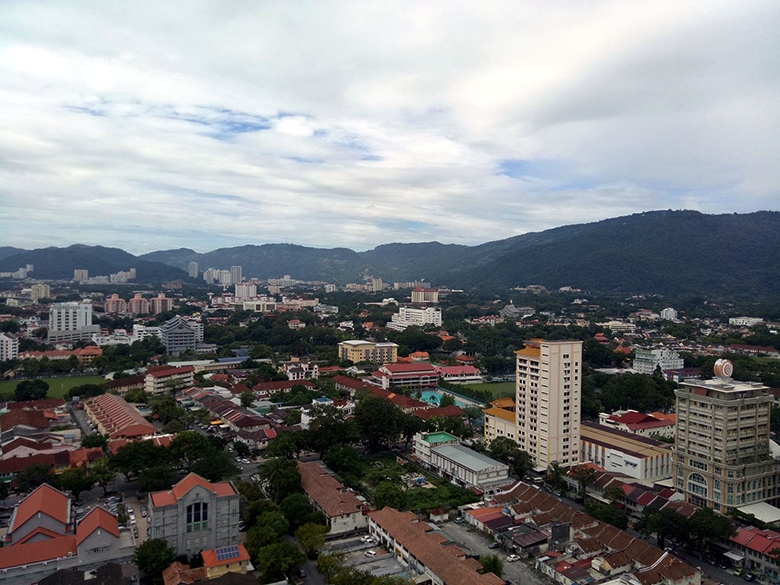
However, unfortunately, my family is faced with a language barrier. The cost of training for foreigners is high. The school program did not coincide with the usual for my son, although, of course, this is an individual question. As for medicine, medicines, with the exception of the simplest, are sold by prescription. As a result, you sign up for a doctor, attend consultations, take tests, apply to the insurance and wait for confirmation of payment or pay in cash with a subsequent refund. Although you needed something, there was some citramon.
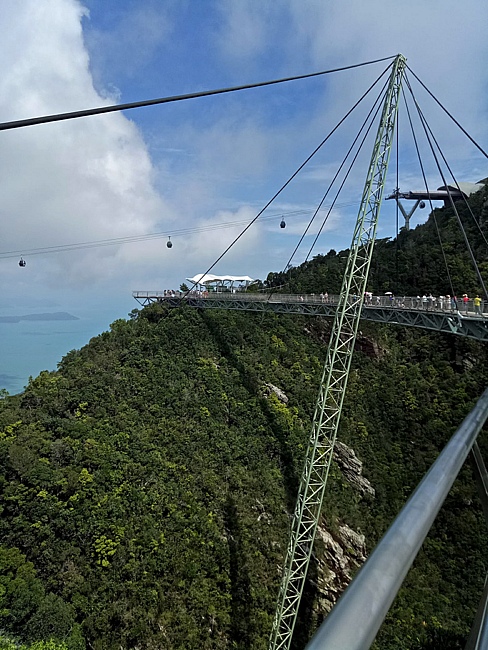
At leisure, too, have something to do. In Malaysia, a huge number of attractions, excellent infrastructure for outdoor activities, beautiful nature, shopping centers, restaurants, nightclubs, exhibitions, shows and events organized by the authorities of the island. Personally, I like a beach holiday on the nearby resort island of Langkawi. Soon I plan to try sea fishing.
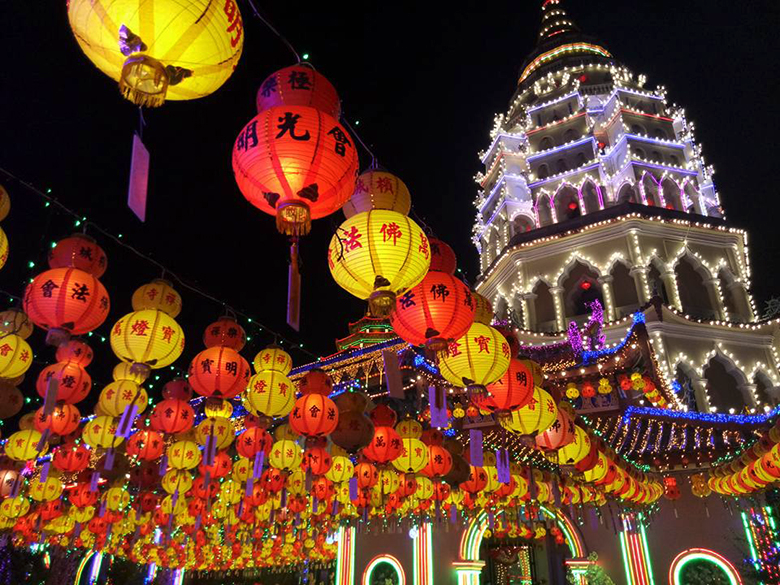
The prices for air tickets at local low-cost airlines are quite acceptable, so my easy-going colleagues are willing to travel to neighboring countries.
At the start I was going to work in Malaysia for at least a couple of years. And soon two years since I moved. It seems that both planned and will. Gradually I start looking at new locations and projects where I could benefit and improve my professional level.
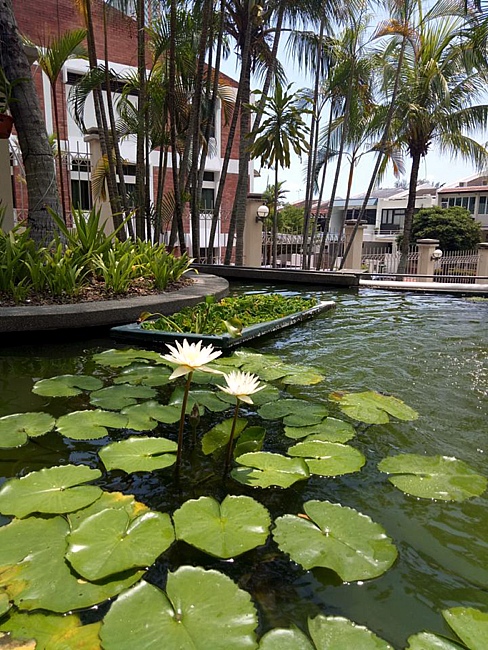
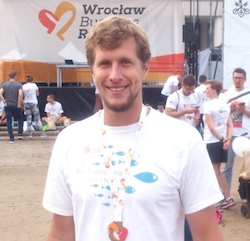
I moved to the company from Nikolaev to Kiev, and in 2013, I became a senior .NET developer, a banking project. He worked on it until 2015 - and managed to become a team leader on it - until I was offered to move to Poland under the Luxoft Global Upgrade program.
Luxoft has a whole department of relocation: they provided me with support from both the Ukrainian and the Polish side. The head of the department in Poland was very serious about the process: he speaks Russian and held several teleconferences where everyone could ask him questions. The company took over all the costs associated with relocation, assisted in obtaining visas and work permits.
In July 2015, I made the move. My colleague and I decided to get to the destination - Wroclaw - by car. We got to the place on Saturday evening and all Sunday departed from the journey. But on Monday was my first working day. By agreement with the management, my move was conceived as seamless, without sacrificing my productivity.
In the early days I was preoccupied with finding an apartment. Of course, I was assisted by realtors, with whom the local office of Luxoft has established contacts. We looked at three options, chose one of them, and on Wednesday I moved to my first rented apartment in Poland.
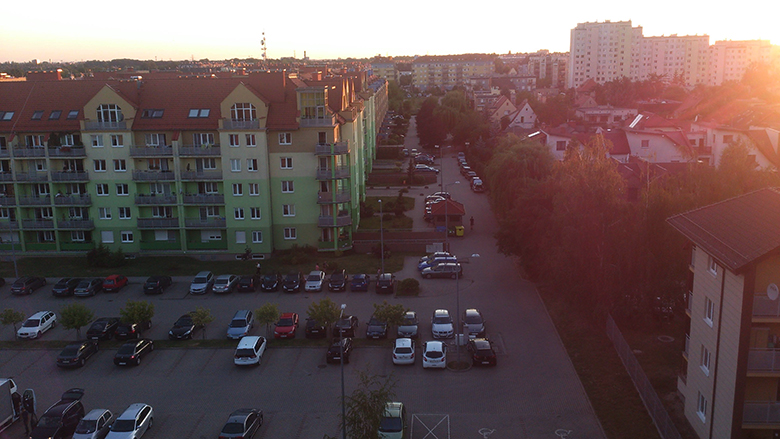
Wroclaw is a relatively compact city. Even from remote sleeping areas, the center is easily accessible on foot in a little more than an hour, and by tram in 20-30 minutes. Bicycle paths are marked everywhere, and it is safe to ride on them. From home to work get 15 minutes.
Our office is based in Silver Tower, a 13-story building near the station. The main contingent is Russian-speaking, the Poles are mainly administrative staff. There are also employees from other countries, including Brazil and Syria.
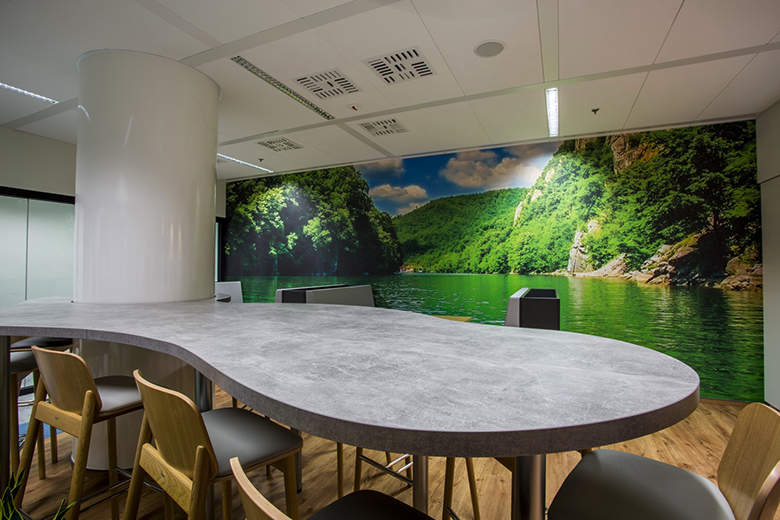
Luxoft's main language of communication is English. When we communicate in a Russian-speaking circle, we speak Russian. If there is a Pole among us, then in Polish. If you come from another country, then in English.
Wroclaw itself is a modest town by our standards - the population is a little more than 600 thousand people, almost half as much as, say, in Rostov. But it is as if stuffed with shopping centers, entertainment facilities, and cultural attractions abound. Yes, remember at least the local airport. It is located in the south, and the windows of our office are on the other side. As a result, we see planes landing one after another. From Wroclaw it is easy to fly to the mass of wonderful points of Europe. There are, say, direct flights to Barcelona.
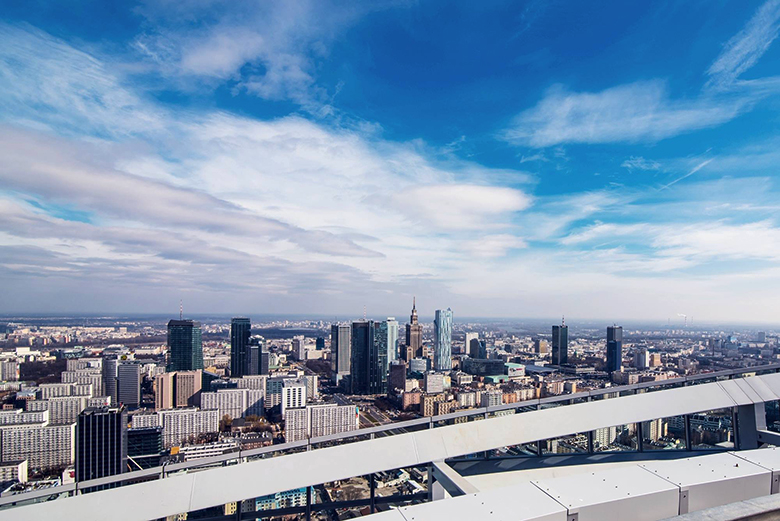
And to Germany and the Czech Republic is even easier to reach by car. To Berlin is within reach - three and a half hours behind the wheel on good roads. It is also convenient to travel to European ski resorts.
The weather is rainy and cool. It is often cloudy. After the move, the St. Petersburg people don't pay attention to the local climate. But with the south of Ukraine, the contrast is strong.
What distinguishes the Poles from the Ukrainians and Russians is the reverent attitude to work-life balance. Recycling is not about them: not because of laziness, it’s just accepted here to clearly separate working and personal time, but also to plan your daily routine. Generous overtime pay is not an absolute motivator for Poles.
It is also noteworthy that Polish IT specialists do not single out themselves into a separate caste and tend to consider themselves ordinary office workers, albeit with their own specifics. There is no aura of chosenness around the profession either inside or outside. Elitism is absent as a phenomenon.
As for the atmosphere in society, the level of politeness is dramatically higher, and therefore in everyday life there is less stress. At home, people are each other by default rather strict, here - rather loyal. And - the situation is safer in principle. Get into the binding in the streets of Wroclaw is very unlikely. You get used to this level of security.
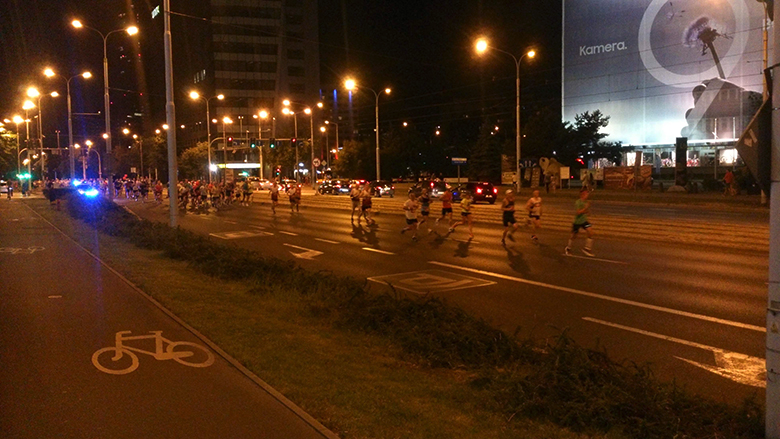
More Poles are extremely athletic. They monitor health, go to fitness rooms, ride bicycles. The density of gyms in Wroclaw is the highest, and they are packed: people do not buy season tickets because of the minute impulse, but regularly go and do it. The MultiSport card is very popular in Poland. On it you can visit a great variety of sports facilities for free or with solid bonuses. For example, in an aquapark it is proposed to spend two hours on it for free, and when this time ends, you need to pay a little. Luxoft pays us for MultiSport, and so it costs 100 zł per month - about $ 30.
Activities outside the city Poles also adore. Windsurfing and kiting - for sure. Popular riding on SUP boards - inflatable "boards" for paddling.
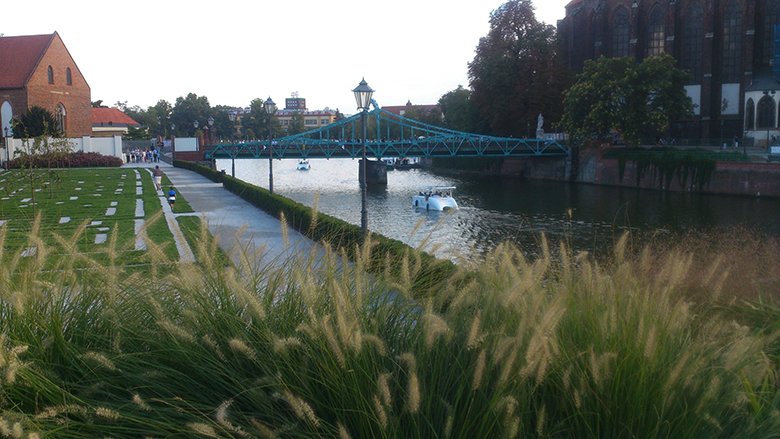
By the way, surprisingly, in the rivers of Poland, with all that, swimming is prohibited. And here’s a paradox: it’s just impossible to plunge into the Oder, on which Wroclaw stands, but please, on the SUP-board. Although no one bothers to supposedly accidentally fall from it into the water and swim a little.
Bad medicine. No matter how they scold our, it's worse. The country has an analogue of OMS, and expensive: in the form of a percentage of the salary of others, it runs up to $ 300 per month. Everyone pays - nowhere to go. Moreover, it is a bit confusing. My friend's polka swelled and started to hurt his eyes. She went to the doctor. And that one to her: “Come in a month, there are no free slots before.” On the same day for one hundred dollars - in local currency - she enrolled in a private clinic.
With extraordinary scruples in Poland belong to the treaties. For example, if the agreement with the Internet provider does not specify otherwise, if you terminate the contract prematurely, you may be required to pay the amount for the entire remaining period. Same with rental housing.
What is very cool: I do not see any reverence for “status” around. Buying expensive cars, phones, clothes for the sake of consumption for show in Poland is not accepted. There is no installation in society: they say it is expensive and cool, but this is the opposite. But if you want shikanut, everything is relatively affordable. The company that cooperates with Luxoft, for example, offers Mercedes for leasing - for 1790 zlotys, about $ 500, take a month and go for health with full insurance.
So, with relief, you can focus on the quality of your own life, and not on showy effects.

Life, people, food, office - all under the cut.
Like other system processes, the relocation in the company is on a firm footing. Many of our employees have been moving to Luxoft offices in Europe, the USA and Asia for years. We have long wanted to ask them how they are there, and we think that many will be interested too.
India
Nadezhda Dobrova, offshore delivery manager in Luxoft India (Bangalore)
 At Luxoft, I have been living and working in Bangalore, southern India for almost two years and for the fifth month. I am doing almost the same thing as at home - I lead a part of the team that serves a large client with long-term projects.
At Luxoft, I have been living and working in Bangalore, southern India for almost two years and for the fifth month. I am doing almost the same thing as at home - I lead a part of the team that serves a large client with long-term projects. I moved with my husband. He is also an employee of Luxoft. True, in Ukraine we didn’t overlap in our work. In India, he had great opportunities for professional and career growth. By luck, a suitable role was found in the local office and for me.
In March, two months before relocation, we were given a study tour. We visited Luxoft's office, met our local colleagues, and started looking for a place to live.
Of course, we hesitated. The country is exotic. To ask for advice was really no one at Luxoft, we were the first to be offered to move to India. But we have long been going to live abroad, and the market has attracted us, and the projects that we had to lead. So they decided to become pioneers.

The company helped us to settle all kinds of formalities. Tourist visa is electronic, no problems arose with it. Then it was necessary to apply for a work visa and pass an interview with the consul, and we managed to turn this procedure in a matter of days. So then the red tape began with the documents. The papers required a whole bale, including proof of the grounds for obtaining the work. For example, it was only recently that they gave me a bank card, and we got used to the fact that it was issued in two or three days. In general, drank bureaucracy.
Bangalore is called the "Indian Silicon Valley". From the point of view of perspective, the comparison is suitable, but otherwise, everything else is different - both in the important and in the small things.

Get at least the situation on the roads - the first thing we encountered on arrival. It's all mixed up: cars, motorcycles, tuk-tuki. And the left-hand movement. Traffic regulations "as it is," but no one observes them. Noise, din, chaos. In some places, cars are moving at a speed of 5 km / h. Major accidents are few, probably precisely because everyone is driving so slowly. In addition, in Bangalore, not the first year they have built a ground metro, which is why half the city is paralyzed.

Something in which reality has significantly diverged from our expectations.
Let's say we were sure that it was cheap to live in India. This is so - with a single amendment: cheap, only if you set up a tent on the street. We settled in a comfortable gated complex, where it is safe and comfortable enough for expats, and this, frankly, is costing us a pretty penny.
It was possible to save money, but with other things being equal, we tried to find housing even closer to work: here distances are measured not in kilometers, but in the hours that you spend on the road. I left in the morning not at 08:00, but at 09:00 - add the extra half hour to shaking in traffic jams.

There is almost no middle class in the country. Contrasts are evident - either glaring poverty, or screaming luxury. You go to work and see the ruins on both sides of the street. But the five-star hotels always have a closed territory, at the entrance and at the entrance there is a full search, something like control at the airport. The same procedures in closed business complexes.
I do not want it to seem as if dark colors prevail in my impressions. Much pleasantly surprised me, including the Indians themselves. They are very friendly, open, funny. Not a bit too tight, not afraid to come into contact with you. Anyone, from a top manager to an intern, can come up and start asking you out with sincere participation.

It would be a mistake to row all Indians with the same brush and consider them to be inactive. But what is needed is to be able to direct their good intentions in the right direction - to “push” colleagues. Often they violate agreements not out of malice: they simply find themselves unable to respond to a request with a refusal. They will say “yes”, but in order for this “yes” to end with the action you need, you have to keep the process under control.
But the workflows are familiar, since we have an IT company. Although it is necessary to keep in mind some nuances of legislation. For example, in India, before leaving for a new place, a specialist is obliged to work out three months on the old one. If you want to change the company earlier - pay a fine, or let the one who shatan you, is calculated for you, provided that the current employer does not mind.
True, if the specialist accepted the offer, this does not mean that you got him into your team. Very often, before going to work, people manage to change their mind, if not disappear from radar. Warned about changing their plans - already happiness. Moreover, failure is often argued by family troubles. Looks like this is a common trick here. However, Indians have many relatives, so surely not everyone is cunning.
Now it is warm, but during the day it is almost always cloudy and windy. Humidity - an average of 80%. It rains often, but not heavy, unlike Mumbai.
During these months we didn’t manage to travel around the country seriously, but we flew to Goa and Chennai to the western and eastern coast, respectively: what’s up there, about an hour by plane. We are here recently, so we continue to learn, and everything is ahead!
Malaysia
Yury Zhurakovsky, software developer at Luxoft Malaysia (Penang)
 I was invited to Luxoft just under relocation to Malaysia. I have been with the company since November 2016, and in Malaysia since mid-January 2017. Upon arrival, I joined the newly assembled multimedia system project team for a number of Asian automakers.
I was invited to Luxoft just under relocation to Malaysia. I have been with the company since November 2016, and in Malaysia since mid-January 2017. Upon arrival, I joined the newly assembled multimedia system project team for a number of Asian automakers. I did not have long torments of choice: an unfamiliar country with a mild climate, new opportunities for development, side by side with strong experts in the field of automotive. Arguments "for" outweighed.
Preparations for the move and the move itself passed without surprises. It was clear that the process in Luxoft is debugged. The relocation manager led me through all the necessary procedures. All I had to do was collect the documents: a diploma, a marriage certificate, birth certificates of children, and so on. The company itself was engaged in the design and legalization of documents, the airline tickets and the hotel of my choice were also booked.
The first priority was to find housing. There were no difficulties with it. Employees of the Malaysian office and colleagues who came earlier advised me to verified realtors. As far as I know, everyone who moved to us from other Luxoft offices found accommodation in two weeks, during which the company pays for hotel accommodation.
The paperwork and the opening of the account were also not too tricky: the relocation manager in the local office took over all the interaction with the official bodies. It only took me to come to the bank, where in half an hour all the formalities were settled.
In the morning of the first working day, the team leader took me from the hotel to the office, helped with all the technical issues, and introduced me to colleagues. I solved household issues already in a quiet mode.
Before arrival, I tried not to speculate either about the island of Penang, where I was to work, nor about Malaysia as a whole. To be honest, both Malaysia and the whole of Southeast Asia seemed to me a mix of fairy tales "Thousand and One Nights", advertising for the Bounty with snow-white beaches and stories about cannibal tribes robbing caravans of merchant ships.

It was unexpected to discover how many different cultures coexist on the island, without interfering with each other. In Penang, and indeed in Malaysia, along with the indigenous population, Malays, live large communities of Chinese, a lot of Indians and representatives of other peoples. And they all get along peacefully, each preserving their traditions and culture. There were some concerns about Sharia law. But he calmed down when he saw Arab women wearing hijabs and chador, Indian women in bright sarees, Chinese girls in short shorts and light T-shirts walking the same streets and shopping centers.
What did not like: there are too few sidewalks in the city. There are areas where there are practically none. In general, the infrastructure for pedestrians is poorly developed. Every now and then you risk to fall under the wheels in a chaotic stream of cars and motorcycles. Moreover, most drivers respect each other.
The culture of the country is far from Central European. A lot of little things that you can only accept. For example, many locals love durian - a fruit with a very specific smell. It is forbidden to carry in hotels and public places. But sometimes love for him takes over. In the harvest season, a small car loaded with durian for all comers regularly arrives at one of our working locations.
For some time, it took me to get used to the Malaysian way of eating without appliances, with my hands: this is how it is accepted. Later, I just stopped noticing it.
Penang prices are deceptive. In the early days on the island, due to the difference in the course — the dollar is about the same as four local ringgits — they seemed ridiculously low to me. Lunch costs from 5 to 20 ringgits, depending on how hungry you are and what level the institution has chosen. In restaurants with European cuisine is more expensive.
My smoking colleagues complain about the high cost of cigarettes. Alcohol prices are high too. So go on a healthy lifestyle - a great strategy for anyone who plans to stay in Penang.
I had no special expectations, so there were no disappointments. The pleasant climate, amazing nature and friendly people are the undoubted advantages of the country. Particularly, I like that there are many modern condominiums on the island with a developed infrastructure: swimming pools, tennis courts, fitness centers. I myself rent apartments literally across the street from the office. So the way to work takes me about ten minutes, taking into account the descent and ascent of the elevators.

However, unfortunately, my family is faced with a language barrier. The cost of training for foreigners is high. The school program did not coincide with the usual for my son, although, of course, this is an individual question. As for medicine, medicines, with the exception of the simplest, are sold by prescription. As a result, you sign up for a doctor, attend consultations, take tests, apply to the insurance and wait for confirmation of payment or pay in cash with a subsequent refund. Although you needed something, there was some citramon.

At leisure, too, have something to do. In Malaysia, a huge number of attractions, excellent infrastructure for outdoor activities, beautiful nature, shopping centers, restaurants, nightclubs, exhibitions, shows and events organized by the authorities of the island. Personally, I like a beach holiday on the nearby resort island of Langkawi. Soon I plan to try sea fishing.

The prices for air tickets at local low-cost airlines are quite acceptable, so my easy-going colleagues are willing to travel to neighboring countries.
At the start I was going to work in Malaysia for at least a couple of years. And soon two years since I moved. It seems that both planned and will. Gradually I start looking at new locations and projects where I could benefit and improve my professional level.

Poland
Anton Danilov, .NET teamlead in Luxoft Poland (Wroclaw)

I moved to the company from Nikolaev to Kiev, and in 2013, I became a senior .NET developer, a banking project. He worked on it until 2015 - and managed to become a team leader on it - until I was offered to move to Poland under the Luxoft Global Upgrade program.
Luxoft has a whole department of relocation: they provided me with support from both the Ukrainian and the Polish side. The head of the department in Poland was very serious about the process: he speaks Russian and held several teleconferences where everyone could ask him questions. The company took over all the costs associated with relocation, assisted in obtaining visas and work permits.
In July 2015, I made the move. My colleague and I decided to get to the destination - Wroclaw - by car. We got to the place on Saturday evening and all Sunday departed from the journey. But on Monday was my first working day. By agreement with the management, my move was conceived as seamless, without sacrificing my productivity.
In the early days I was preoccupied with finding an apartment. Of course, I was assisted by realtors, with whom the local office of Luxoft has established contacts. We looked at three options, chose one of them, and on Wednesday I moved to my first rented apartment in Poland.

Wroclaw is a relatively compact city. Even from remote sleeping areas, the center is easily accessible on foot in a little more than an hour, and by tram in 20-30 minutes. Bicycle paths are marked everywhere, and it is safe to ride on them. From home to work get 15 minutes.
Our office is based in Silver Tower, a 13-story building near the station. The main contingent is Russian-speaking, the Poles are mainly administrative staff. There are also employees from other countries, including Brazil and Syria.

Luxoft's main language of communication is English. When we communicate in a Russian-speaking circle, we speak Russian. If there is a Pole among us, then in Polish. If you come from another country, then in English.
Wroclaw itself is a modest town by our standards - the population is a little more than 600 thousand people, almost half as much as, say, in Rostov. But it is as if stuffed with shopping centers, entertainment facilities, and cultural attractions abound. Yes, remember at least the local airport. It is located in the south, and the windows of our office are on the other side. As a result, we see planes landing one after another. From Wroclaw it is easy to fly to the mass of wonderful points of Europe. There are, say, direct flights to Barcelona.

And to Germany and the Czech Republic is even easier to reach by car. To Berlin is within reach - three and a half hours behind the wheel on good roads. It is also convenient to travel to European ski resorts.
The weather is rainy and cool. It is often cloudy. After the move, the St. Petersburg people don't pay attention to the local climate. But with the south of Ukraine, the contrast is strong.
What distinguishes the Poles from the Ukrainians and Russians is the reverent attitude to work-life balance. Recycling is not about them: not because of laziness, it’s just accepted here to clearly separate working and personal time, but also to plan your daily routine. Generous overtime pay is not an absolute motivator for Poles.
Many peculiar in their organization time. According to the local legislation, if you manage to have dinner in less than 15 minutes, this time is considered working, so local colleagues prefer to have a quick snack. In addition, the Poles are trying to come to work early, for example, by 07:00, to leave at 15:00.
It is also noteworthy that Polish IT specialists do not single out themselves into a separate caste and tend to consider themselves ordinary office workers, albeit with their own specifics. There is no aura of chosenness around the profession either inside or outside. Elitism is absent as a phenomenon.
As for the atmosphere in society, the level of politeness is dramatically higher, and therefore in everyday life there is less stress. At home, people are each other by default rather strict, here - rather loyal. And - the situation is safer in principle. Get into the binding in the streets of Wroclaw is very unlikely. You get used to this level of security.

More Poles are extremely athletic. They monitor health, go to fitness rooms, ride bicycles. The density of gyms in Wroclaw is the highest, and they are packed: people do not buy season tickets because of the minute impulse, but regularly go and do it. The MultiSport card is very popular in Poland. On it you can visit a great variety of sports facilities for free or with solid bonuses. For example, in an aquapark it is proposed to spend two hours on it for free, and when this time ends, you need to pay a little. Luxoft pays us for MultiSport, and so it costs 100 zł per month - about $ 30.
Activities outside the city Poles also adore. Windsurfing and kiting - for sure. Popular riding on SUP boards - inflatable "boards" for paddling.

By the way, surprisingly, in the rivers of Poland, with all that, swimming is prohibited. And here’s a paradox: it’s just impossible to plunge into the Oder, on which Wroclaw stands, but please, on the SUP-board. Although no one bothers to supposedly accidentally fall from it into the water and swim a little.
Minuses? Pound bureaucracy. A year to wait for a residence permit is a common story. And when you apply for a residence permit, you cannot get out of the country with an expired visa. They may lose documents, to issue them incorrectly.
Bad medicine. No matter how they scold our, it's worse. The country has an analogue of OMS, and expensive: in the form of a percentage of the salary of others, it runs up to $ 300 per month. Everyone pays - nowhere to go. Moreover, it is a bit confusing. My friend's polka swelled and started to hurt his eyes. She went to the doctor. And that one to her: “Come in a month, there are no free slots before.” On the same day for one hundred dollars - in local currency - she enrolled in a private clinic.
With extraordinary scruples in Poland belong to the treaties. For example, if the agreement with the Internet provider does not specify otherwise, if you terminate the contract prematurely, you may be required to pay the amount for the entire remaining period. Same with rental housing.
What is very cool: I do not see any reverence for “status” around. Buying expensive cars, phones, clothes for the sake of consumption for show in Poland is not accepted. There is no installation in society: they say it is expensive and cool, but this is the opposite. But if you want shikanut, everything is relatively affordable. The company that cooperates with Luxoft, for example, offers Mercedes for leasing - for 1790 zlotys, about $ 500, take a month and go for health with full insurance.
So, with relief, you can focus on the quality of your own life, and not on showy effects.
